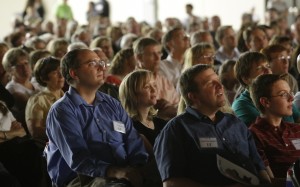Supreme Court rulings on same-sex marriage have energized activists and politicians on both sides of the debate. Efforts to impose bans — and to repeal them — have taken on new intensity, as have lawsuits by gays demanding the right to marry.
The rulings, while hailed by gay-rights activists, did not declare a nationwide right for gays to marry. Instead, they set the stage for state-by-state battles over one of America’s most contentious social issues.

On Wednesday, June 26, he Supreme Court ruled in favor of expanded gay marriage rights in two major 5-4 decisions that were the most highly anticipated of this judicial session. The Court struck down the Defense of Marriage Act (DOMA), a law defining marriage as between a man and a woman, and dismissed arguments in support of Proposition 8, saying the defendants/supporters in the case had no legal standing.
In the days following, the four plaintiffs in the case that overturned California’s same-sex marriage ban tied the knot Friday, June 28, just hours after a federal appeals court freed gay couples to obtain marriage licenses in the state for the first time in 4 1/2 years.
On Sunday, June 30, Supreme Court Justice Anthony Kennedy denied a last-ditch request from the sponsors of California’s now-overturned gay marriage ban to halt the issuance of same-sex marriage licenses.
Political reactions to the decisions have been swift and widespread.
Prominent Utah Republicans overwhelmingly applauded the Supreme Court for recognizing same-sex marriage as a states’ rights issue but expressed disappointment that the Supreme Court is not in harmony with the Congressional majority that favors DOMA.
Utah Democrats, on the other hand, unequivocally praised the pair of decisions and urged Utah to adopt a similar stance.
“Utah must now decide if it is ready to open its arms to diversity and recognize that marriage is good for all society or if the state will continue to discriminate,” said Utah Democratic Party Chair Jim Dabakis, who proposed to his partner at a party Wednesday, June 27, celebrating the demise of the Defense of Marriage Act.
Sen. Orrin Hatch, R-Utah, said proponents of gay marriage misrepresented DOMA as a malicious, discriminatory bill.
“It’s pretty hard to believe that the Supreme Court would say that the 85 Senators, 342 members of the House of Representatives, and Democratic President Bill Clinton — all who supported DOMA when it was signed into law nearly 20 years ago — voted for DOMA literally seeking to injure and impose stigma on gay individuals,” said Hatch, who supported the bill when it passed in 1996.
Utah has been under the political microscope with all matters related to same-sex marriage in consequence of extensive Latter-day Saint involvement in California’s 2008 Proposition 8 campaign. Dabakis, aware of the deeply held conservative views of most Utahns regarding marriage’s role in religion, asked that the state separate religious issues from government policy.
“Religious matters, including marriage, should be left strictly to the churches, but civil matters should be accepted without discrimination,” Dabakis said.
The Church of Jesus Christ of Latter-day Saints offered an official statement responding to the Supreme Court’s decisions, saying the Church supported traditional marriage and questioned the prerogative of the Supreme Court to easily overturn a popular vote.
“By ruling that supporters of Proposition 8 lacked standing to bring this case to court, the Supreme Court has highlighted troubling questions about how our democratic and judicial system operates. Many Californians will wonder if there is something fundamentally wrong when their government will not defend or protect a popular vote that reflects the views of the majority of citizens,” the statement says.
Utah Gov. Gary Herbert released a statement underlining what he says is states’ rights to decide legal issues surrounding same-sex marriage. He additionally said he is in favor of anti-discrimination policy, but also supports traditional marriage.
“I have long believed that marriage is a states’ rights issue,” Herbert said. “I support and will continue to defend Utah’s constitutional definition of marriage as the legal union between a man and a woman. I also believe that discrimination has no place in society. I hope we can find a path that protects all from discrimination while defending the sanctity of traditional marriage.”
In Pennsylvania, the only Northeast state that doesn’t legally recognize same-sex couples, gay state Rep. Brian Sims, a Philadelphia Democrat, says he will introduce a bill to allow same-sex marriages. The bill may flounder in the GOP-led Legislature, but the issue is likely to be volatile in next year’s gubernatorial race.
In Arizona, gay-rights supporters have begun circulating petitions aimed at repealing the state’s 2008 ban on same-sex marriage by way of a ballot measure next year. With California’s ban quashed, Arizona is now among 29 states with constitutional amendments that limit marriage to one-man, one-woman unions.
West Virginia has a state law prohibiting gay marriages. Until now, though, it has not joined the parade of states taking a further step with a constitutional amendment. After the Supreme Court rulings, the leader of the large Republican minority in the House of Delegates suggested there is now an urgent need for an amendment.
National gay-rights leaders expect that lawsuits seeking to expand gay marriage rights will eventually bring the issue back to the Supreme Court in a quest for a ruling that would establish a 50-state policy.
Lawsuits already are pending in Utah, Michigan, New Mexico and other states.
Gay-rights activists in some conservative states say there is no near-term prospect for softening their states’ gay-marriage bans, and they’re looking toward a more incremental approach. In states such as Georgia, Idaho and Louisiana, these efforts include lobbying for local and statewide anti-discrimination laws that would extend protections to gays and lesbians.
Contributing: The Associated Press




